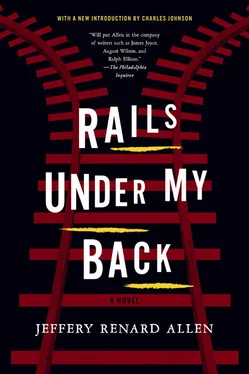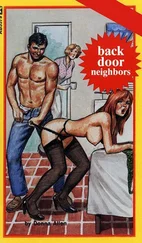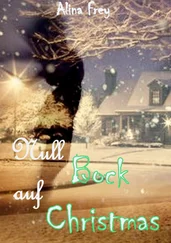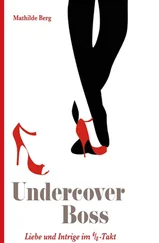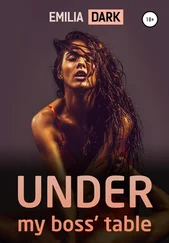HUNDRED GATES ROSE behind a ragged screen of pine trees. When Porsha saw it, tired left her body with the sweat. Glad to be home. She made her way quickly inside and up to her loft. Once inside, she studied the spring evening. Behind clear rectangular panes of glass, she looked out over the treetops, a beautician above a client’s hair. She must prepare for Deathrow.
She bathed for the third time that day. Powdered and scented her private parts.
Her eyes shined in the silver box of mirror that held her reflection. In paradise, her eyes might not have shone so brightly. She brushed her teeth. Lula Mae, Mamma, and Gracie had all lost their teeth by age thirty. R.L. had milk gums, Mamma said. Maybe it was something in the water we used to drink. Maybe what we ate. We didn’t know back then. And thirty was looking her in the face, two years down the line. She brushed. She would halt destiny.
She checked the answering machine. One message, one voice. Porsha, hey. How you doing? This is Hatch. I went to see Inez today. She wants to see you. She says that it’s important. You can call me if you want to. Talk to you later. Bye.
TIME WAS OUTSIDE, looking on. Looking in. Deathrow was late. Freighted with waiting, she seated herself in a comfortable chair and flipped through a magazine. Her trained eye recognized her body pasted beneath another model’s face. Two or three years ago, she could easily identify her body in a photograph. However, as of late, other models had started to imitate her body. Her poses. Her gestures. Her texture. And photographers used lighting that glistened like juice on berry skin like hers.
She turned the leaves of her magazine.
A three-year-old confessed to drowning her baby cousin in a bucket of bleach and water.
Should she call Deathrow?
… idea on the very cutting edge of the mortuary business. These plastic tombstones are cheaper, lighter, and more durable than stone. And etched letters are virtually eternal. In the near future, they will be all the rave.
She was no longer reading. The print offered a resting place for her eyes. It occurred to her how little she knew about Deathrow’s origins. She had not seen a single twig of his family tree. Roots sunk in darkness. Red Hook had given birth to him. I ain’t got no family, he’d said. I’ll tell you this, he said. I been to hell and back with gasoline draws. But like I said, it ain’t where you come from, it’s where you going.
THE MOON ROSE HUGE AND RED. She had been waiting more than an hour — one identical hour repeated over and over again — sitting, and thinking of Deathrow. Had he fallen into nested sleep? The phone rang.
Hello?
Bill?
Bill?
Is Bill there?
You got the wrong number.
Is this—
She slammed the receiver down.
She dialed Deathrow’s number. The line rang and rang while she twisted and untwisted the telephone cord around her finger. The receiver grew pregnant, became too heavy for her to hold.
SHE LIKED TO LIE ON HER BED in the dark, run her hands over her naked body. The image she saw in the mirror, the body she could see with her eyes, her fingers saw differently in the dark. The mountains of her breasts and the valley of her hard stomach were only shadows and shapes, smoothed of all desire.
THE SMELL OF GASOLINE ruins the cold winter smell of the day. The blaze is beautiful as it catches, weed by weed, the hedges haloed with fire, a sound like ocean, the pond shining, white as the mountains behind it. The skating is good. The balance, the ease, the sense of sailing over hard surface, the blades cutting a whistling trail of white flakes. Figure eights are his favorites, time beating in the skate rhythms of the hourglass shape. Crunching, the ice gives in like a trapdoor. He sinks. He sees the sun through the ice, a weak hanging bulb. The deeper he goes, the dimmer the light. And he is falling quickly, as if weighted, clawing out at the finger-refusing rungs of a cold ladder, the ice coming away in his hands. Bubbles rush past his face, the cold cuts through his body as he reaches for the bubbles, chain links that will pull him to the surface. Not worried about drowning; in fact, he can breathe perfectly well. It is the falling, the lack of ground beneath his feet that’s troubling. He wedges to a rest, directly in the center of the ice, unable to twitch a muscle. Can’t even turn his head. He uses his teeth.
The phone’s rhythmic ringing cuts through sleep; slices of night black-break away in a steady beat like the clanking of a train over rail ties or a hatchet falling to the chopping board, again and again. Black light freezes the hours.
Hello.
Lucifer?
Know that voice anywhere. Gracie?
John’s gone.
What?
John’s gone.
His heart fluttered — a soft rushing noise — wings unable to break the cage of his chest. What do you mean, gone?
I feel it.
He weighed the word. I see. The clock on the nightstand, glowing face and dial: 4 a.m.
Please come.
He looked over his shoulder. Sheila’s left breast peeked at him from over the sheet. Okay, I’ll come. See you soon. He hung up the phone without waiting for a response.
Who was that?
Gracie.
Gracie?
Yeah.
Gracie?
She had a feeling—
Behind him he heard Sheila roll over in her sleep.
Moonlight came silver through the window. It made objects look different, gave them glowing skin. He moved to the chair before the window and raised the shade a little. An edge of street. Splotches of light, the glow of the streetlights. The sky, a star-eaten blanket. Then slow rain and an occasional tire hissing over wet streets. Illuminated night allowed him to see a watery blur of trees that surrounded the house. Gracie’s call put a hole in his rest. A feeling.
John the engineer. Places his school ruler flat across his clipboard, curves the ruler along the clipboard and angles the train out of the station, his mouth motion-wise under the ruler’s control, accelerating, screeching — rails — easing off speed.
In the T Street apartment, Lucifer and John shared a tunnel-like room lined with Georgiana’s canned food. Lucifer’s bed faced the window — year-round, the windows stayed shut against the stink of the stockyards — the sun flashing between rushing clouds and, at night, the moon walking in light. A bed too short for him, his frosted toes hanging over the edge winter mornings. Woke early on those mornings in a humming house, while John slept in reaching distance of him, and Georgiana and Pappa Simmons in their closet-sized room. Walked through the coal-steaming apartment, wood buckling under his toes, buckling and crackling, popping like squeezed knuckles. Bathed, scrubbed his skin, shaved off his red widow’s peak— yes, shaving it, even as a child to protect himself from sharp laughter — with Pappa Simmons’s straight razor, then returning to bed and lying there, naked, warm, beneath Bingo’s wet dog smell.
The first thing Pappa Simmons did every morning, regardless of weather, was step out onto the back porch naked and check the sky, the wind. He was not red or yellow or white, but some shade between autumn and winter; his old blood ran cold and thick, and his labor-bowed legs were too slow to keep up with two growing grandsons. He never said much, kept up a black cloak of distance, fixing this or that thing around the house, hammer in hand and nails in his mouth. Georgiana polished your shoes, smoothed the wrinkles out of your clothes, combed your naps — rather, you combed your own naps before you entered her kitchen (her bacon crackling on the stove and fresh glasses of lemonade or tea on the table), lest she do it and leave you tender-headed — and checked your ears for roaches. Dress you like twins on Sunday. Put your hands (smooth) in hers (weathered) and walk you to school or church.
Читать дальше
